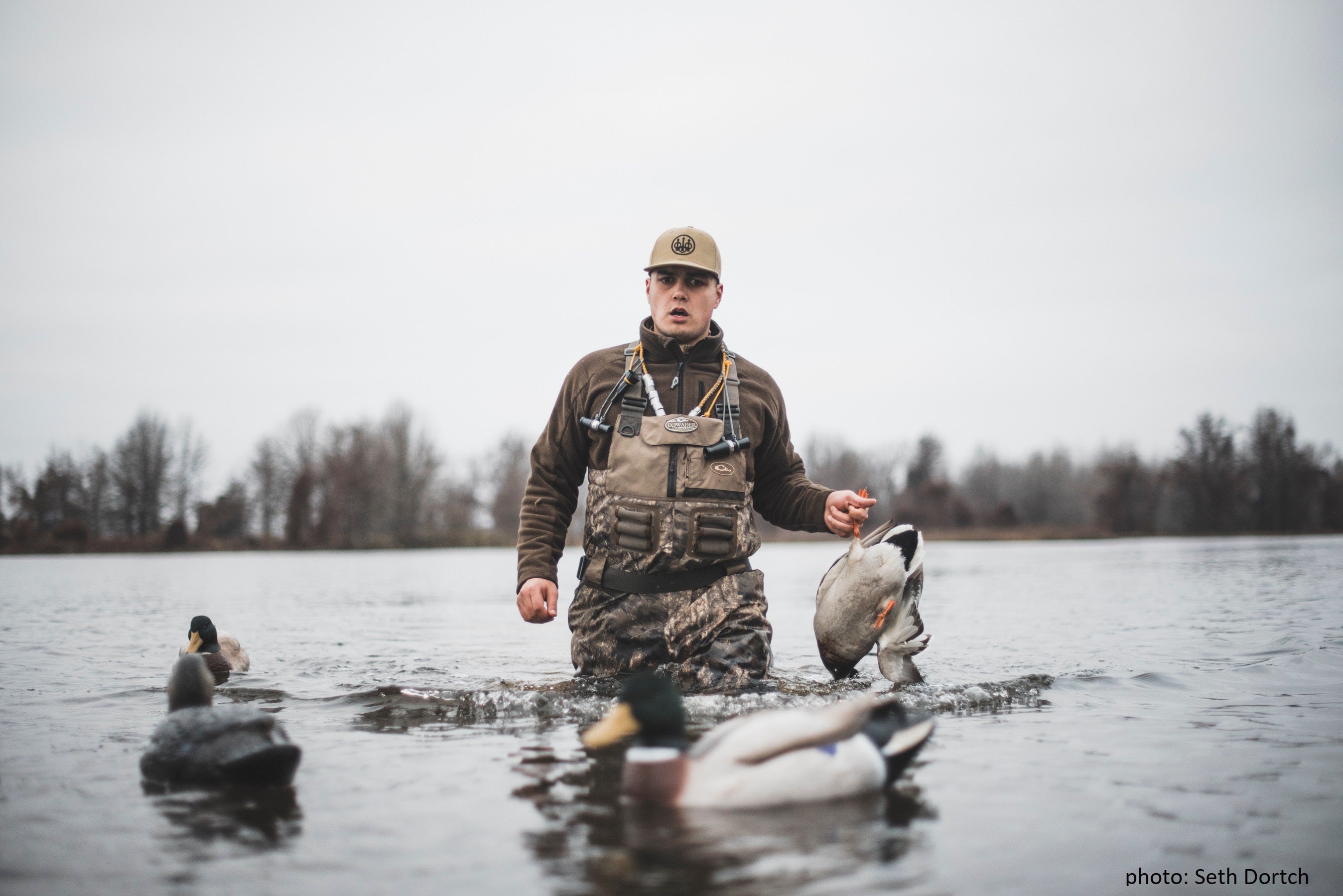3 Problems Duck Hunters Face with Hearing Protection

Let's face it, repetitive shooting is bad for unprotected ears. There are a lot of research studies and a lot of ringing ears to prove that. In our last blog, we discussed how loud calling can also cause permanent hearing damage. If you have duck hunted very long, you have probably had your "bell rung" by the guy next to you swinging his barrel too close your ears. How many 60+ year old duck hunters do you know that still have good hearing?
So if we know we are damaging our ears, why do most duck hunters not use hearing protection?
As we developed TETRA Hearing™ technology, we asked hundreds of hunters this question and we consistently got three answers.
1. "I need to hear the sounds of the hunt. With earplugs I can't hear anything, and with amplified plugs everything sounds too loud."
If you have tried wearing earplugs in the blind, you know that while they are effective at lowering the volume of the gunshot, they lower the volume of everything else too. It's harder to communicate, especially when the caller is whispering, "Out front," or "Swinging around the sound end." Duck hunting is as much about the camaraderie, jokes, and story telling as it is about the ducks on the strap. The fear of missing the punch line to a joke or not hearing your buddies make fun of a missed shot causes many hunters to forego hearing protection altogether.
Amplified muffs or ear plugs help some with voices, but traditional solutions amplify too much. Candy wrappers, wind noise, and boat motors can be loud and uncomfortable, covering up the sound of voices and waterfowl.
2. "Hearing protection is just not comfortable."
Many of the hunters we surveyed cited discomfort as a primary reason for not using hearing protection. We heard complaints of feeling "too stopped up," "my own voice is uncomfortable," and "I hate the way they feel in my ears." For hunters that use electronic muffs, the complaints were about being able to shoot and shoulder the gun properly. Because of the uncomfortable experience, only the most committed hunters stuck with hearing protection, and even then, they reported that they couldn't wait to take them out.
3. "My call doesn't sound right, and I can't kill ducks if I can't call."
When our ears are stopped up or blocked, we get the "occlusion effect." The occlusion effect occurs when sound pressure, produced internally when we talk, chew, or grunt into a call, is trapped in the ear canal making those sounds too loud and unnatural.
Earplugs and muffs also destroy the natural resonance of the ear. Our outer ear is a natural amplifier. Just like a musical instrument is designed to produce certain frequencies, the shape of our ear boosts sounds in the 1000 to 3000-Hz range. When we plug the ear with hearing protection, we kill that natural resonance. This changes the frequency response of what we hear and makes everything sound duller and less "bright."
How TETRA solves these three problems.
1. TETRA Waterfowl products protect hearing, but bring the sounds of the hunt back to normal levels.
We acoustically analyzed the hunting soundscape and developed our patent-pending Specialized Target Optimization (STO). STO uses digital signal processing to make the most important sounds of the hunt audible at natural levels, making voices clear, and noises of wind, water, and rustling normal.
2. TETRA products are small and comfortable.
AlphaShield is a one-size-fits-all product that in our research and development fit comfortably in over 90% of ears. We also have a line of custom products that are molded to the exact contours of the ear. Both of these allow hunters to shoulder the gun properly, don't interfere with hoods or beanies, fit securely, and can be worn comfortably all day.
3. Calling sounds natural with TETRA.
We spent hundreds of hours in research and development measuring the sound properties of calling in the ear. Using multi-channel digital signal processing, we matched the sound of the call through the TETRA devices to the sound in an open ear, making for the best sound quality and most natural calling experience, while still protecting the ear from damage.
Above is a video we did demonstrating how TETRA AlphaShield produces ideal sound for calling. TETRA technology has been tested by some of the best in the calling game
"I always knew hearing protection was extremely important when out hunting," explains 2018 World Champion and Power Calls pro-staffer, Kile Jones. "Almost every piece of hearing protection on the market made it extremely difficult to understand what I was trying to communicate to the ducks or geese with a call. I was EXTREMELY skeptical about the Tetra system due to my previous experiences. I am extremely excited and relieved after wearing TETRA that is now so much easier to call and protect my hearing at the same time, without sacrificing the punctuation of my notes. I can now hear jokes being told at the end of the blind, protect my ears when we fire into a flock and properly enunciate my notes when calling."
If you are one of the majority of hunters that haven't found a good solution to protect your hearing, check out TETRA this season.
By:
David Gnewikow, Ph.D.
Co-Founder, TETRA
1 comment





I had the awesome opportunity to go to Arkansas for my first duck hunt with an old friend and some new ones. I am likely hooked. The thing I can’t believe is that waterfowlers would not wear hearing protection because we fired a lot off shots over three days at ducks and geese. I was fortunate to have in my ears a pair of the Tetra AlphaShields. They were amazing. They shut down the blast from the muzzle but what was crazy is what it did to the wind. It was blowing 20-25mph and you could not hear it. If I would have had my walker game ear on that’s all I would have been able to basically hear. These guys have figured it out. I could hear the call, the laughter and even the dogs whimper of excitement. They were so comfortable and fit great. They offer several size options for the earpiece and several styles. I found the larger memory foam tips worked best for me.If you are not wearing these when in the blind, pit or timber shame on you. I value my hearing and loved all the sounds of my first hunt. I can’t wait to try the amp pods when turkey season arrives. Thanks guys for what is some great new technology just in time for this new duck hunter.